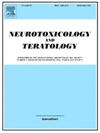Manganese induces neuroinflammation through SPON1-mediated activation of ERK1/2/NF-κB pathway
IF 2.8
3区 医学
Q3 NEUROSCIENCES
引用次数: 0
Abstract
Excessive accumulation of manganese (Mn) can cause neuroinflammation, impairing cognitive function. SPON1, a secreted glycoprotein in the extracellular matrix, is implicated in neuroinflammation, but its role in activating pro-inflammatory pathways in Mn-induced neuroinflammation remains unclear. This study employed in vivo and in vitro models to investigate Mn neuroinflammation. The expression levels of SPON1 and the ERK1/2/NF-κB pathway associated with inflammation were measured in male C57BL/6 mice after gavage of Mn at different doses (0, 25, 50, 100 mg/kg) for 12 weeks. SPON1 levels were measured after primary hippocampal neurons, primary cortical neurons, neuroblastoma cells (N2a), and microglial cells (BV2) were exposed to various concentrations of Mn for 24 h. We observed that in vivo Mn exposure significantly decreased SPON1 expression in the cortex but not in the hippocampus. Similarly, in vitro experiments demonstrated that Mn exposure significantly reduced SPON1 levels in primary cortical neurons, N2a, and BV2. In addition, Mn exposure increased the expression levels of ERK1/2 and NF-κB pathway proteins in the mouse cortex. Because BV2 cells are susceptible to inflammatory signals, they were chosen to elucidate how SPON1 induces neuroinflammation during Mn exposure. SPON1 knockdown increases the expression of inflammatory factors, whereas SPON1 overexpression inhibits the activation of the ERK1/2/NF-κB pathway and reduces inflammatory factor levels. In summary, these results suggest that Mn may affect the activation of ERK1/2/NF-κB pathway and the expression of inflammatory factors by inhibiting SPON1, ultimately promoting neuroinflammation.
锰通过spon1介导的ERK1/2/NF-κB通路激活诱导神经炎症。
锰(Mn)的过量积累可引起神经炎症,损害认知功能。SPON1是细胞外基质中分泌的糖蛋白,与神经炎症有关,但其在mn诱导的神经炎症中激活促炎通路的作用尚不清楚。本研究采用体内和体外模型研究Mn神经炎症。在不同剂量(0、25、50、100 mg/kg) Mn灌胃12 周后,检测雄性C57BL/6小鼠SPON1和与炎症相关的ERK1/2/NF-κB通路的表达水平。将原代海马神经元、原代皮质神经元、神经母细胞瘤细胞(N2a)和小胶质细胞(BV2)暴露在不同浓度的Mn中24 h后,测量SPON1的水平。我们观察到体内Mn暴露显著降低了皮层而不是海马的SPON1表达。同样,体外实验表明,Mn暴露显著降低了原代皮质神经元、N2a和BV2中的SPON1水平。此外,Mn暴露增加了小鼠皮质ERK1/2和NF-κB通路蛋白的表达水平。由于BV2细胞对炎症信号敏感,因此选择它们来阐明在Mn暴露期间SPON1如何诱导神经炎症。SPON1敲低会增加炎症因子的表达,而SPON1过表达会抑制ERK1/2/NF-κB通路的激活,降低炎症因子水平。综上所述,这些结果提示Mn可能通过抑制SPON1影响ERK1/2/NF-κB通路的激活和炎症因子的表达,最终促进神经炎症。
本文章由计算机程序翻译,如有差异,请以英文原文为准。
求助全文
约1分钟内获得全文
求助全文
来源期刊
CiteScore
5.60
自引率
10.30%
发文量
48
审稿时长
58 days
期刊介绍:
Neurotoxicology and Teratology provides a forum for publishing new information regarding the effects of chemical and physical agents on the developing, adult or aging nervous system. In this context, the fields of neurotoxicology and teratology include studies of agent-induced alterations of nervous system function, with a focus on behavioral outcomes and their underlying physiological and neurochemical mechanisms. The Journal publishes original, peer-reviewed Research Reports of experimental, clinical, and epidemiological studies that address the neurotoxicity and/or functional teratology of pesticides, solvents, heavy metals, nanomaterials, organometals, industrial compounds, mixtures, drugs of abuse, pharmaceuticals, animal and plant toxins, atmospheric reaction products, and physical agents such as radiation and noise. These reports include traditional mammalian neurotoxicology experiments, human studies, studies using non-mammalian animal models, and mechanistic studies in vivo or in vitro. Special Issues, Reviews, Commentaries, Meeting Reports, and Symposium Papers provide timely updates on areas that have reached a critical point of synthesis, on aspects of a scientific field undergoing rapid change, or on areas that present special methodological or interpretive problems. Theoretical Articles address concepts and potential mechanisms underlying actions of agents of interest in the nervous system. The Journal also publishes Brief Communications that concisely describe a new method, technique, apparatus, or experimental result.

 求助内容:
求助内容: 应助结果提醒方式:
应助结果提醒方式:


